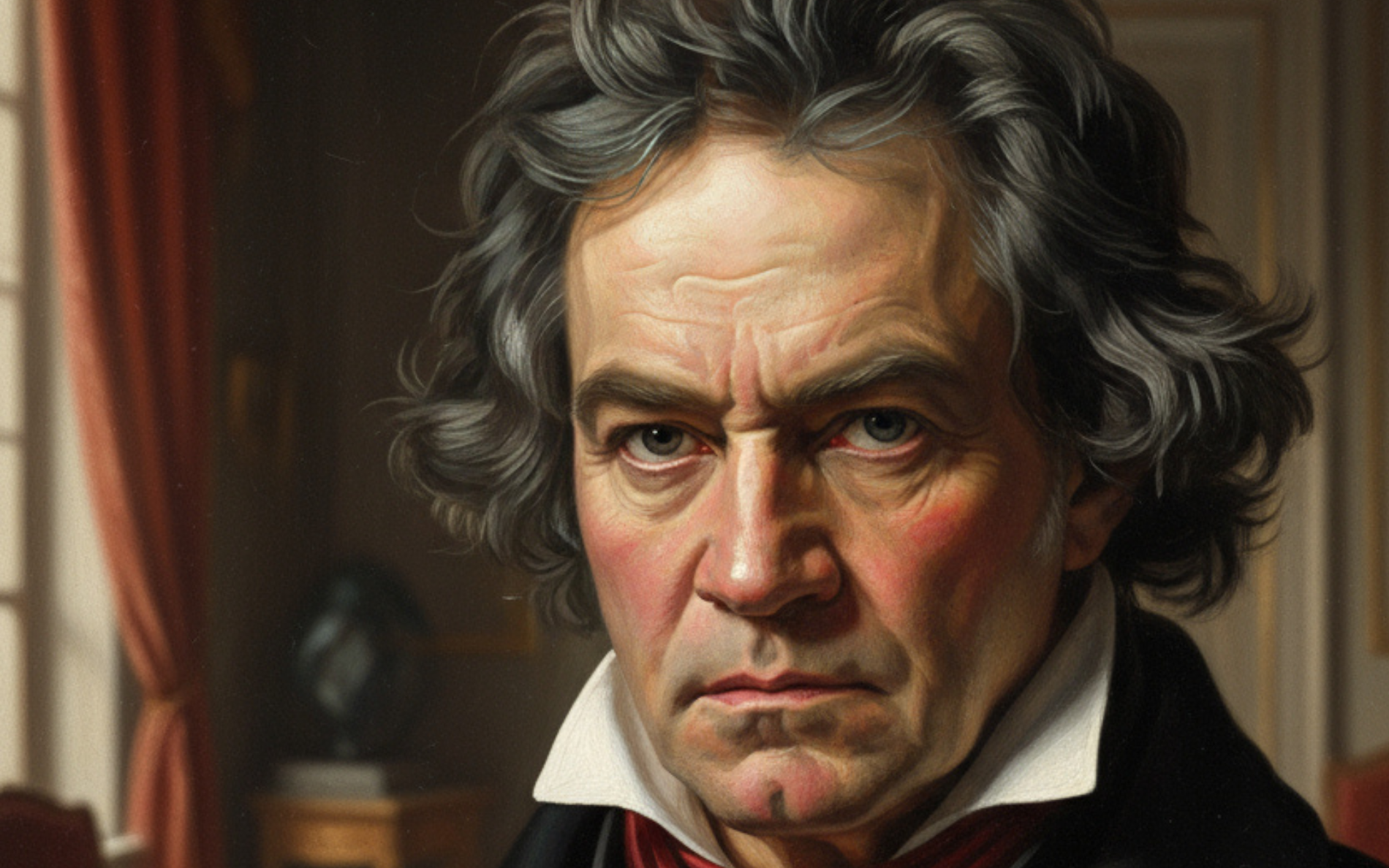Now Reading: Ludwig van Beethoven: The Composer Who Redefined Music
-
01
Ludwig van Beethoven: The Composer Who Redefined Music
Ludwig van Beethoven: The Composer Who Redefined Music

Article by – Seshlin Naidu
The date. December 1770. The place. A house in Bonn Germany. The what? The world
is graced with the very first harmonies created by an artist revered both in his time and
ours. The cries of the newly born Ludwig van Beethoven.
Beethoven. Pianist. Composer. The man responsible for atleats 2 of those songs you
grew up with but don’t quite know the name of and that one movie about the most
wholesome St.Barnard. At a young age Beethoven exhibited the kind of musical talent
that would make anyone go “Oh… Oh he’s going to be a star!” Initially taught extensively
by his father Johann van Beethoven, Ludwig would later have his first work published
under the guidance of Christian Gottlob Neefe. Neefe was a German opera composer
and conductor. In 1798, now living in Vienna, Beethoven had started displaying
symptoms of hearing loss.
However as mentioned this is no mere mortal. This was a
legend with a Midas-esque touch as in anything he would touch would turn to gold!
Though his hearing would deteriorate from 1804 to 1811, Beethoven would consistently
put out music. He would release his Third and Fifth Symphonies as well as his last
piano concerto, No.5, Op, 73 favourably known as the Emperor. It was dedicated to a
consistent patron, Archduke Rudolf of Austria. Sadly by 1815 Beethoven was all but
deaf and had stopped performing and was barely seen in public.
Beethoven would express his deteriorating health issues as well as his unfulfilled
personal life in 2 letters “Heiligenstadt Testament” in 1802 addressed to his brothers and
“Immortal Beloved” an unsent love letter addressed to an unknown lover in 1812.
Beethoven’s namesake comes from his grandfather Ludwig van Beethoven. He was a
musician from the city of Mechelen in Austria Netherlands (now Belgium). He’d move to
Bonn when he was just 21 years old and was then employed as a bass singer at the
court of Clemens August, Archbishop- Elector of Cologne. Suffice to say it was a grand
honour. In 1761 Ludwig would ascend to Kapellmeister. Thus would cement him as a
prominent musician in Bonn. Ludwig would have 2 sons. One of whom we are
somewhat acquainted with. Johann van Beethoven. The father of Ludwig van
Beethoven. Jihann would marry Maria Magdalena Keverich in 1767. Ludwig van
Beethoven was born of this marriage. Johann and Maria would have 7 children however
very sadly, only Ludwig and his 2 younger brothers would survive infancy. Their names
were Kaspor Anton Karl and Nikolaus Johann.
Beethoven’s work was one that saw a great many evolutions. Changes in style, emotion
and rhythm. Due to different circumstances throughout the years this showed a
testament to Beethoven’s persistence and passion for music. Famed historian William
Drabkin has said as early as 1818 a writer had suggested a 3 period division in
Beethoven’s music. Some issues arise from that notion. For example, it leaves out
Beethoven’s early work in Bonn but hey! That’s not for me to dissect. I’m simply here
for the music that could be playing in a ballroom while I wear my very bespoke tux and I
lock eyes with a beautiful, jaw dropping woman who sips champagne as the strings are
pulling us closer to each other.
The periods I’m question are his time in Bonn from 1782 – 1792, the first period, the
middle period and the late period.
Bonn 1782 – 1792
By 1785 approximately 40 compositions including 10 very early works were written by
Beethoven. However these pieces of work may be viewed fondly now but by 1785 to
about 1790 it is believed that Beethoven had practically abandoned composition ad a
whole due to very negative and harsh reactions from the general public and critics alike.
In the Musikalischer Almanack a review left stated that Beethoven’s work was no better
than a pitiful amateur.
First Period 1792
It started after his settlement in Vienna. It was in 1795 and onward that Beethoven had
mastered the style best known by Haydn and Mozart but was making it his own. That
style being the Viennese style. An immediate example of this would be his work on
sonatas from 1795 – 1800 being written in 4 movements as opposed to the norm of just
3 movements.
Middle Period
This Period consists of several pieces of work that convey immense heroism and
struggle as the weight and severity of Beethoven’s continuous hearing loss became
more and more apparent. This work includes his 6 Symphonies (Nos. 7 – 11), piano
sonatas Op.53 and Op.57, his only opera Fidelio , the Kreutzer violin sonata and his last
2 piano concertos Triple Concerto and violin concerto.
Late Period
A new era could only be born with a renewed study of the last. Palestrina, Johann
Sebastian Bach and the man Beethoven himself would call the “greatest composer who
ever lived” George Frideric Handel. Beethoven’s late work used a treasure trove of
styles including polyphony, church modes and Baroque – Era devices. Beethoven would
return to the keyboard bringing with him a new style. His last 5 piano sonatas, The
Diabelli Variations, the last 2 sonatas for cello and piano, the late string quartets and
Missa Solemnis and Ninth Symphony. Beethoven’s late period is often looked at for the
innovations made, the intellectual depth and the intense, very deep personal
expressions. Beethoven’s “Ninth Symphony” adds choral sounds in the final movement
invoking an “ever lasting” feeling.
Beethoven’s legacy is one of many great feats. Innovation, revolution and evolution. His
impact on classical music is still relevant in our modern day. His manipulation of strings
and understanding of the human condition has brought forth intense emotions, deep
passions and heart throbbing dramas. His work had the ability to to leave audience
mystified, conveying feelings of victory, struggle and joy.
We take this time today to remember and celebrate a man who’s legendary influence
shapes and molds the music of tomorrow.
























